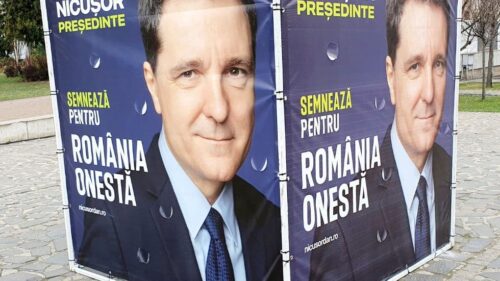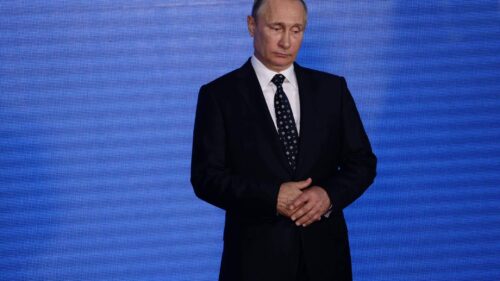The global fight against foreign influence has entered a precarious phase.
In April, US President Donald Trump shut down the last State Department office specifically tasked with countering foreign information manipulation, raising concerns about America’s vulnerability to the effects of influence operations by Russia, China and Iran. Critics warn that this “unilateral disarmament” leaves democratic institutions increasingly exposed at a time when hostile actors are intensifying their digital campaigns.
Against this backdrop, understanding and countering Russian efforts of hybrid warfare in Central and Eastern Europe (CEE) has never been more urgent.
While the means have modernized, the core tactics remain unchanged. In contemporary CEE, Russian campaigns aim to destabilize governments, undermine public trust in institutions and loosen the region’s integration with the EU and NATO. These operations exploit divisive issues — migration, minority rights, historical grievances — to inflame cultural tensions and depress voter turnout, thereby strengthening populist or Eurosceptic forces that align with Moscow’s strategic interests. These efforts extend beyond influencing election outcomes. They aim to corrode public confidence in democratic governance itself.
While trust in national parliaments and the EU has fluctuated over the past two decades, it has remained relatively stable — for now. This article assesses how Russia deployed digital instruments of influence in CEE in the context of two recently concluded elections and highlights strategies to strengthen institutional resilience.
Romania: a test of democratic resilience amid influence operations and populist surge
Romania’s May presidential election highlights how foreign interference can catalyze domestic unrest. In the initial round held on November 24, 2024, far-right candidate Călin Georgescu led with approximately 23% of the vote, narrowly ahead of centrist liberal Elena Lasconi with 19.18%. A runoff was scheduled for December 8.
But just days before the final vote, Romania’s Constitutional Court annulled the results, citing credible evidence of Russian interference, particularly through TikTok campaigns supporting Georgescu. After an unsuccessful appeal to the European Court of Human Rights, the election was rescheduled for May 2025.
After that, Georgescu was barred from participating in the upcoming presidential election re-run, with his most recent polling numbers prior to being barred having surged to as high as 38%. This rise is not driven by Georgescu’s pro-Kremlin views, although he has publicly praised Russian President Vladimir Putin and criticized NATO. It had much more to do with voter discontent with Romania’s political class and judiciary. Despite Georgescu’s rhetoric, 87.5% of Romanians support the EU and NATO alignment; fewer than 5% favor closer ties with Russia. But at the same time, two out of three Romanians see themselves as “second-class citizens in Europe”. This can, to a certain extent, explain the high vote counts among the Romanian diaspora for Georgescu ally George Simion, especially in Western EU member states.
This disconnect signals a shift that what began as a case of foreign information manipulation and interference has evolved into a classic case of domestic information manipulation and interference — in which influence operations, seeded externally, take on a life of their own through local grievances and disillusionment.
In the rescheduled election, held on May 4, Simion led the first round with 40.96% of the vote, while independent candidate Nicușor Dan secured 20.99%. The runoff on 18 May saw Dan achieve a surprising victory with 53.6% of the vote. Dan’s support was notably strong among urban voters, women and ethnic minorities, particularly the Hungarian community.
Following the election, Simion contested the results, alleging mass voter fraud. However, the Romanian Constitutional Court rejected his claims, and Dan was inaugurated on May 26.
Despite the victory of a pro-European candidate, Romania offers a cautionary tale: While foreign actors may spark instability, it is domestic disillusionment that sustains it.
Presidential elections in Poland: a vulnerable moment for Russia’s fiercest critic
Poland is a key NATO member and a vital supply route for aid to Ukraine, making it a major target for Russian interference. The government, led by Donald Tusk, is trying to reverse democratic backsliding caused by its predecessors,but its success also hinges on cooperation from the president, who can block new laws.
Given the presence of Russian disinformation in the Polish infosphere and suspicions of growing interference ahead of the elections, the Ministry of Digitalization established an “Electoral Umbrella” in January 2025. This initiative aimed to monitor manipulated content, provided training for electoral committees, journalists, and election organizers, enhanced protection for critical applications, and offered a free tool for cybersecurity diagnostics.
As Polish society is deeply suspicious of pro-Kremlin rhetoric, Russian influence campaigns rarely express direct support for Moscow. Instead, they aim to weaken support for Ukraine by discrediting Ukrainian politicians and refugees, spreading false stories and amplifying negative developments.
These campaigns also try to divide Polish society by stoking arguments over values, immigration, EU and socioeconomic situation.. In the electoral context, a goal is also to discourage people from voting — by discrediting leading candidates or promoting the idea that voting doesn’t matter.
A study by Alliance4Europe found that in March and early April, Russian-linked accounts on X (formerly Twitter) shared posted links to legitimate media outlets, highlighting carefully chosen excerpts that echoed Russian narratives. These cherry-picked quotes—often taken out of context — focused on criticism of the EU, Ukraine, political elites, and economic problems. The goal was to boost the credibility of misleading messages by tying them to trusted sources. In the weeks leading up to elections two main tactics were “Overload,” the spread of overwhelming and contradictory information to cause confusion, and “Doppelgänger,” the impersonation of trusted media outlets to disseminate disinformation. A controversy was sparked by a case involving third-party Facebook advertisements, potentially funded from foreign sources. The ads had been visible on Facebook for an extended period, and journalists reported on them before authorities addressed the issue publicly.
The OSCE observers criticized the effectiveness of anti-disinformation measures which in their opinion were “weakened by insufficient institutional co-ordination, limited and delayed public communication around the measures taken, and inconsistent responses by social platforms”
Among the 13 candidates who were running in the first round of Poland’s presidential race, at least two were openly pro-Kremlin and have spread false information. Although both remained marginal in polling and their social media reach remained low, one of them managed to gather a surprising 6% of all votes. The presence of such candidates has sparked debate about the necessity of more rigorous background checks. While no one was actively advocating for these candidates’ disqualification, fearing turning them into political martyrs (like a “Georgescu effect”), their pro-Putin statements were amplified and cited in Russian media.
In the second round held on June 1, nationalist candidate Karol Nawrocki narrowly defeated pro-European Warsaw Mayor Rafał Trzaskowski, securing 50.89% of the vote. Nawrocki’s victory, backed by the Law and Justice (PiS) party, represents a significant setback for Prime Minister Donald Tusk’s centrist coalition and reformist ambitions.
Nawrocki, a historian with no prior elected office experience, is expected to use his presidential veto power to challenge Tusk’s legislative agenda, particularly judicial and social reforms. His win extends PiS’s influence despite their 2023 parliamentary loss and is seen as a win by European nationalist and populist leaders. The result may leave Poland in a political deadlock.
Compared to Romania, the impact and reach of Russian influence operations in the digital space in Poland remained lower than expected. However, election monitoring groups noted a sharp uptick in inauthentic activity in the final days before the runoff, though these did not appear to alter the outcome. Although the election outcome may align with Russian interests, it was not the result of direct Russian interference during the campaign. However, long-term disinformation efforts have contributed and will likely continue to contribute to deepening social polarization and attempts to destabilize the country through various means, including cyber operations.
A global test of democratic immunity
The Romanian and Polish elections highlight a crucial evolution in disinformation tactics — and why they matter beyond national borders. Foreign influence campaigns may begin online, but their most disruptive effects appear offline, as voters channel frustration into support for fringe or anti-establishment candidates. In this way, the threat is no longer purely external. It becomes internal, sustained by domestic discontent and magnified by digital echo chambers.
The result is long-term damage to trust in democratic institutions, leaving societies more vulnerable to populism and authoritarian appeals. This dynamic isn’t limited to Europe. The recent decision by the United States to dismantle its foreign influence watchdog comes at precisely the wrong time, just when democratic coordination is most needed.
Central and Eastern European democracies may be the first testing ground, but they are not the only one. The ability of Romania and Poland to resist both external manipulation and internal breakdown will serve as a barometer for the resilience of liberal democracy more broadly.
For Washington and its allies, the lesson is clear: Russia is playing the long game. Countering digital interference is not a secondary concern — it is a strategic imperative, essential to preserving democratic integrity at both regional and global levels.
The views expressed in this article are the author’s own and do not necessarily reflect Fair Observer’s editorial policy.
Support Fair Observer
We rely on your support for our independence, diversity and quality.
For more than 10 years, Fair Observer has been free, fair and independent. No billionaire owns us, no advertisers control us. We are a reader-supported nonprofit. Unlike many other publications, we keep our content free for readers regardless of where they live or whether they can afford to pay. We have no paywalls and no ads.
In the post-truth era of fake news, echo chambers and filter bubbles, we publish a plurality of perspectives from around the world. Anyone can publish with us, but everyone goes through a rigorous editorial process. So, you get fact-checked, well-reasoned content instead of noise.
We publish 3,000+ voices from 90+ countries. We also conduct education and training programs
on subjects ranging from digital media and journalism to writing and critical thinking. This
doesn’t come cheap. Servers, editors, trainers and web developers cost
money.
Please consider supporting us on a regular basis as a recurring donor or a
sustaining member.
Will you support FO’s journalism?
We rely on your support for our independence, diversity and quality.








Comment